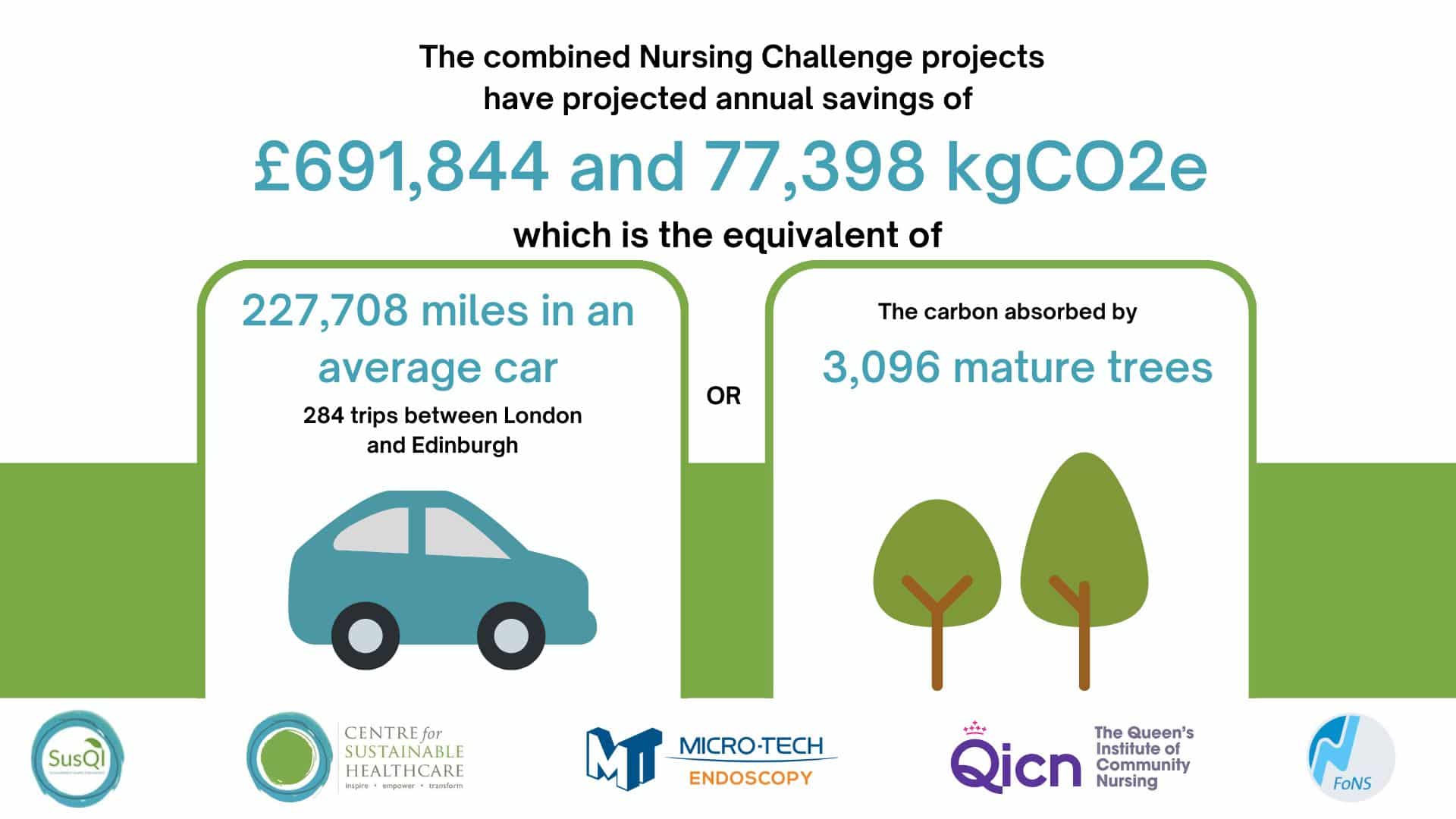
Green Nursing Challenge Showcase 2025 videos and case study reports
The Green Nursing Showcase took place on 20 October 2025 from 09:30 to 12:30. The event was dedicated to highlighting the inspiring work of the six project teams taking part in the Green Nursing Challenge. These teams are leading the way in creating more sustainable and equitable nursing care across a range of clinical settings.

“There are rare moments when I see the future of nursing unfold… and today I saw it within all of the projects.”
Dr Marion Lynch, B.E.M. RN RMN. Global Health Consultant, Creative Health Consultant. Educator and Researcher. Trustee with Foundation of Nursing Studies (FONS)
At the event, each of the selected teams presented their Sustainable Quality Improvement (SusQI) projects to a panel of expert judges. Their projects focused on priority areas identified through collaboration with challenge partners, carbon footprinting analysis, and discussions with people with lived experience. The aim of these projects was to reduce environmental harm and address health inequalities in nursing services. Teams presented their projects to a judging panel including:
- Dr Jonny Groome, Paediatric Anaesthetic Consultant, Lead for Greener Theatres at Barts Health NHS Trust, Honorary Associate Professor of Sustainability, UCL
- Lucy Brown, Clinical Delivery Lead at The Centre for Sustainable Healthcare
- Dr Marion Lynch, B.E.M. RN RMN. Global Health Consultant, Creative Health Consultant. Educator and Researcher. Trustee with Foundation of Nursing Studies (FONS)
- Dr Amanda Young, Director of Nursing Programmes, Innovation and Policy at Queens Community Nursing Institute
Read the Impact Report here.
Videos and case study reports
Recordings of each presentation are available below, providing opportunity to learn from innovative projects shaping the future of nursing care.
A heartfelt thank you to our keynote speaker, Charlotte McArdle, Global nurse consultant and former CNO for Northern Ireland and DCNO at NHS England, for her brilliant and inspiring opening talk.

“The quality of the projects here in terms of your approach, methodology, reporting and outcomes are absolutely incredible and surpass anything I’ve seen… not just within the nursing domain, within sustainable healthcare in general.”
Dr Jonny Groome, Paediatric Anaesthetic Consultant, Lead for Greener Theatres at Barts Health NHS Trust, Honorary Associate Professor of Sustainability, UCL
Norfolk and Norwich University Hospital (Winner)
The team at Norfolk and Norwich University Hospital developed a combined Maternity and Inflammatory Bowel Disease (IBD) clinic aimed at reducing repeat appointments, streamlining care pathways, and cutting associated carbon emissions. By bringing together maternity and IBD services, the clinic sought to provide more coordinated, high-value care that improves outcomes for both mothers and babies within this patient group. The combined clinic launched in March/April was the result of close collaboration between professionals across both specialties, working together to deliver more efficient, person-centred, and environmentally sustainable care.
Read the report and case study in full here
Oxford Health Foundation Trust, Planned and Preventative Care (Highly Commended)
The team from Oxford Health Foundation Trust, Planned and Preventative Care, introduced continuous blood glucose monitoring to support more effective diabetes management in patients’ homes. This initiative aimed to reduce avoidable hospital admissions by enabling earlier intervention and better ongoing control of blood glucose levels. The community-based team focused on ensuring that all patients receiving insulin are reviewed comprehensively, helping to deliver care that is safer, more personalised, and of higher value. By improving the quality of care in the community and reducing the need for emergency interventions, the project also sought to lower healthcare costs and minimise the environmental impact associated with hospital-based care.
Read the report and case study in full here
Sheffield Progressive Care Unit
The team at the Sheffield Progressive Care Unit planned to introduce reusable kidney dishes to replace the single-use pulp variety that currently requires maceration and is widely used across the Trust. This initiative aimed to reduce clinical waste, lower associated disposal costs, and promote more sustainable practices within the organisation. The project began with implementation in the Progressive Care Unit, with plans to scale up across the entire Trust. It has involved close collaboration with multiple departments, including procurement, infection prevention, estates, and clinical teams, to ensure the change is both safe and effective. By embedding sustainability into routine clinical practice, the team hoped to demonstrate the practical benefits of greener healthcare solutions.
Read the report and case study in full here
Liverpool Heart & Chest Hospital
The team on the cardiac unit aimed to switch from intravenous to oral administration for certain medications. Promoting the use of oral medication (instead of intravenous) where appropriate, the team focused on three key drugs—paracetamol, phosphates, and potassium—with the intention of reducing patient risks, cutting costs, and lowering the environmental impact of care. They also sought to standardise intravenous line ‘hanging times’ and prevent unnecessary changes.

Video available soon
Read the report and case study in full here
Lewisham Community & Primary Care Team
The team working in bladder, bowel and pelvic health in the community designed a structured ‘Trial Without Catheter’ process to reduce urinary catheter overuse, minimise the unnecessary length of time catheters remain in place, prevent patient complications, and reduce hospital interventions and admissions. The project also aimed to lower travel and mileage for patients, staff, and ambulance services. By improving staff training and building confidence in catheter care, the team hoped to ensure that catheters are removed promptly when clinically appropriate, supporting safer, more sustainable care in the community.
Read the report and case study in full here
Birmingham Community Healthcare
The nurses working in the community in Birmingham implemented the use of a digital app to support patients with long-term conditions—improving self-management, preventing deterioration, and reducing care-related emissions. The app enables patients to send photographs directly to the clinical team, allowing for effective triage and helping to avoid unnecessary ambulance journeys, home visits, and hospital admissions. By adopting this digital approach, the team aimed to deliver more responsive, efficient, and environmentally sustainable care.
Read the report and case study in full here
The impact of this challenge has been significant, with an estimated £691,844 in cost and efficiency savings annually and 77,398 kgCO2e reduced annually, equivalent to the carbon absorbed by 3,096 mature trees or 284 trips between London and Edinburgh in an average car. A full impact report can be viewed or downloaded here.

To go back and read more about the whole project please head back to our dedicated project page.
